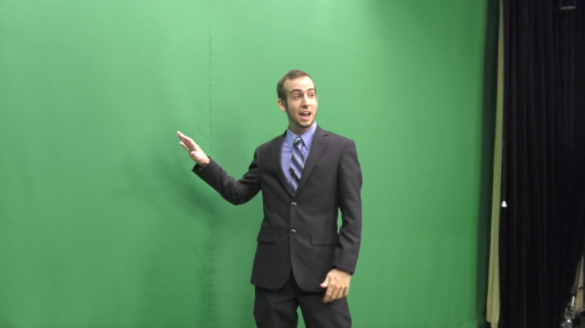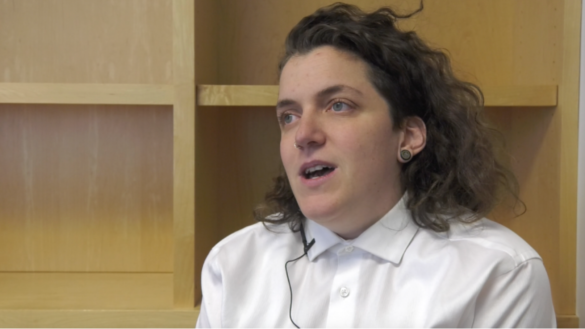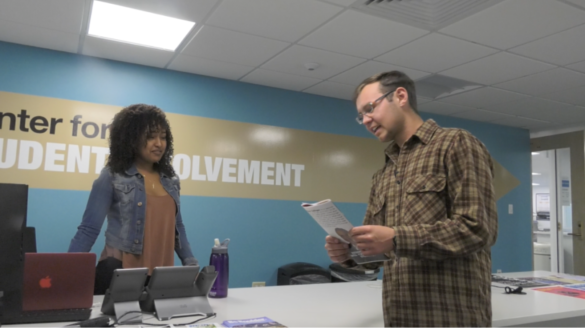Feeling the Heat: Job Market Bound

BY: NATALIE TORRES MAY 2, 2017
Graduation season has begun across the country, and it’s expected that nearly 1.9 million students will graduate with a college degree this spring. Although the unemployment rate for college graduates is only 2.5 percent, improving in recent years, finding a job immediately after graduation can be both daunting and difficult.
With bills and loans to pay off, many college graduates become worried when they find themselves with a degree but without a job. According to U.S. News & World Report, approximately 70 percent of college students graduate with student loans. The average 2016 graduate has $37,172 in student debt.
While some soon to be graduates at the CU Boulder already have jobs lined up, many students are still searching for that elusive job.
Jesse Hughes is a journalism student who will be graduating this spring. Although, he started his job hunt back in October, and has applied to over 50 different jobs across the country, he still hasn’t landed a position. Not having a job and with graduation around the corner, this upsets Hughes.
“It is actually very frustrating that I’ve applied to so many different places, and the majority of them haven’t got back to me” says Hughes.

Jesse Hughes
Even though he still doesn’t have a job, Hughes says he will continue to apply until he finds something. And although his ideal job is to be a producer or photographer, he’s willing to be flexible.
“I would be willing to be a reporter, I’d be willing to be an anchor,” says Hughes, “I’m willing to go with anything and everything.”
Another soon to be journalism graduate Austin Kopnitsky is a student who already landed a job in his dream field- as a meteorologist.
“I am going to be the weekend meteorologist and multimedia journalist during the week at KCAU AT CHANNEL 9 at Sioux City Iowa” says Kopnitsky.
Kopnitsky says he began looking for jobs only a few weeks ago, and recently found out he had got a job after staying in contact with a news station producer he met during one of NewsTeams classes.
Kopnitsky admits that before getting the job in Iowa, he felt an immense amount of pressure to have a job after graduation. He spent countless sleepless nights just thinking about this.
Fortunately, now that Kopnitsky has a job, he feels relieved. His advice to students still looking for jobs is that they shouldn’t get discouraged, and should continue applying to as many jobs as possible.
While breaking into the field of journalism can be competitive and challenging for new graduates, tenacity, perseverance and skill-building may be the right traits needed to succeed.
Story published on Newsteamboulder.tv
Why One CU Student Is Embracing the Word ‘Victim’

BY: NATALIE TORRES APRIL 25, 2017
For many, the word ‘victim’ has a negative connotation, especially when it comes after experiencing sexual assault. In our society, using the word ‘victim’ to describe someone is seen as an insult. According to an article by the Huffington Post, the word ‘victim’ is frequently used in a judgmental and derogatory way. Shame and weakness are attached to this term.
Beth Whalley is a victim of sexual assault, but she doesn’t view the word ‘victim’ in a negative way. In fact, Whalley embraces this term, and she wants to combat the assumptions made.
“Having survived sexual assault, I think it’s important to identify as a victim,” said Beth Whalley “Because I don’t see it as a negative, and I want to combat that common narrative that puts us in that position.”
Whalley is a PhD student who is only weeks away from graduating. She’s also finishing her dissertation that analyzes the rape culture in the United States and Ireland, a place she called her home for six months three years ago. Whalley says her dissertation takes a transnational feminist approach.

Beth Whalley
Although, Whalley experienced sexual assault while she was an undergraduate student in New York, she says her passion for learning and studying sexual violence started long before. It was while taking sociology and gender classes in college when she became interested in studying sexual harassment. This is why it bothers her when people assume that she’s doing her dissertation on rape, only because of her personal experience.
“A lot of people assume that I study rape because I was raped,” said Whalley.
Whalley does admit that her experience changed the way she thought about the issue. She learned that victims can’t prevent their own sexual assault.
As she completes her dissertation, Whalley hopes sexual assault victims/survivors – whichever way they choose to identify – find validation in her work.
“I think that if they saw my work and they were like thank you for suggesting that the way to fix my experience or to find healing is not necessarily through criminal legal means,” said Whalley.
She knows that each victim copes with their experiences in different ways. This is why she thinks it’s important for victims to have agency when it comes to choosing whether or not they want to report their perpetuator or just want to receive counseling.
Resources like The Office of Victim Assistance (OVA) at CU offer confidential services to students and staff, even when these aren’t ready or want to report their case. Jessica Ladd-Webert, the Director at OVA, says their office is confidential, and they help people know their rights and options if they do decide to report. Just like Whalley, Ladd-Webert believes it’s up to the victim to make the decision they want.

Jessica Ladd-Webert
“And we are not here to report what happened to them,” said Jessica Ladd-Webert, “That is their choice.”
As for Whalley, she will continue to do more research on sexual assault. She’s looking forward to her new job in Birmingham where she will be a Sociology Professor.
Story published on Newsteamboulder.tv
Proposed EPA Budget Cuts; Why it’s Concerning CU Students?

BY: NATALIE TORRES APRIL 18, 2017
Back in March, just a few months into his presidency, Donald Trump announced proposed budget cuts from the Environmental Protection Agency (EPA). Under Trump’s proposal, it’s expected the EPA’s budget will be cut by almost 31%. In addition, funding for climate change research, efforts aimed at improving energy efficiency, among other things, are also expected to be cut.
Although, president Trump’s proposed budget cuts have yet to be approved by Congress, this has concerned and horrified not only numerous environmental groups across the country, but also students.
President Trump’s proposed EPA cuts go far beyond climate change https://t.co/WmNMC9MtQm
— The New York Times (@nytimes) April 11, 2017
P.D. Gantert is a former CU student who graduated with a degree in Geography this past December. Although, he’s no longer a student, he’s still an active member of Fossil Free CU; an environmental group that supports sustainability and clean energy.Gantert is motivated and passionate about protecting the environment because this is an issue that hits close to home. He grew up in Lancaster, Pennsylvania, a rural area where oil and gas fracking began. He’s witnessed the devastating effects this has had on his community. “And I see what happens to communities around me, and my community when really wealthy fossil fuel executives get to roll in and extract resources from that community,” said P.D. Gantert.
These extractions have impacted the water quality back home. “I had friends and family members that from time to time would have to get drinking water trucked in because their well water was no longer safe to drink,” said P.D. Gantert. Through the skills he’s learned with being part of Fossil Free CU, he’s trying to stop an oil pipeline from going through his hometown back in Pennsylvania. His goal is to go back to Lancaster and motivate the community.

P.D. Gantert
“I’m going to go back to Lancaster, Pennsylvania and give people the information they need,” Said P.D. Gantert, “And the invitation that they need to get involved in this work to stop the pipeline that’s going through the place I grew up.” The EPA; the agency that might help him with his efforts, is facing a fight for its own survival.
Although, many other students like Gantert are concerned with how the proposed budget cuts will impact their work and efforts, there’s no need to be worried just yet. According to CU Law Professor, Mark Squillace, President Trump can’t change these regulations overnight. “Mr. Trump comes in and wants to get rid of some of these regulations. Well, he can’t just do it by fiat,” Said Mark Squillace, “He has to actually go through a process just like the rule making process.”

Professor Squillace
Everything is a process. Professor Squillace predicts that if the EPA budget cuts are approved, they will be much more modest than initially proposed. As for now, Congress is still considering the President’s proposal.
Story published on Newsteamboulder.tv
Racial Discrimination at CU Boulder; What is being done?

BY: NATALIE TORRES MARCH 21, 2017
With tears in her eyes, Selam Abbady stared down at the table as she remembered the two incidents that forever changed her student experience. As she told the story of these unfortunate events in which she was called racial slurs, it’s evident she was feeling a lot of pain and sadness.
The first time she was called the ‘n’ word, she was walking on campus near the Hill. All she can remember is a black car yelling racial slurs as they quickly drove off. At this moment, her and her friends were shocked and confused as to how to respond. The second incident occurred while she was walking to one of her friends dorms around Farrand Field. She recalls a group of female students saying the ‘n’ word and laughing about it. It was at this moment when Selam’s college experience changed forever.
“I don’t know how to explain it, it just hurt me. I was like ‘How can anyone just do that?’” said Abbady, “You don’t know me.” Selam Abbady, Biology major has experienced racial discrimination at CU.
Selam Abbady, Biology major has experienced racial discrimination at CU.
Abbady is a second year biology student at the University of Colorado Boulder who has big dreams of becoming a doctor. More specifically, she wants to focus on HIV and AIDS prevention because she wants to make a difference in her community. HIV/AIDS is a disease that greatly affects the African American community, and Abbady wants to help bring more medical awareness.
Although, Abbady has tried to remain strong and succeed in her academics, she admits it has been difficult. The racial slurs she was called during her freshman year continue to impact and hurt her. Since last year, she admits to feeling more insecure. She’s afraid of speaking up in her classes because she doesn’t know what or how her classmates will respond to her. Instead, she tries to attract the least attention so that no one notices her.
“If I ask a question I feel like my question or input is not as important as anyone else’s,” said Selam Abbady.
These experiences made Abbady feel unwelcome and unsafe, but she never reported either incident to the university. Even after the second time she was called a racial slur, Abbady says the only person she confided in were in her friends and family. Instead of reporting this to the school, Abbady felt lost and confused as to how and where to make a report. Another reason why she failed to say anything is because she felt the university didn’t care and wasn’t wasn’t going to do anything about the matter. Even a year after all of this, Abbady continues to feel the same way. She wishes the university would do more to create and maintain a safe space for students of color.
Ore Folarin is another student who has witnessed similar experiences. Although, she has never been directly racially discriminated on campus, some of her friends have also been called racial slurs. Folarin says not only have her friends been called hurtful words, but they have seen these written in bathroom stalls. Unlike Abbady, Folarin’s friends immediately reported this to the university. Instead of publicly addressing the matter and doing more to protect these students, Folarin says the university simply ‘covered’ the slurs in the bathroom stalls. She wishes the school would have done more to protect her friends and other students who were and are victims of racial discrimination. Ore Folarin is a psychology major at CU.
Ore Folarin is a psychology major at CU.
According to the Office of Institutional Equity and Compliance (OIEC) at CU, any type of discrimination is unacceptable on our campus. Teresa Wroe, the Title IX coordinator of OIEC says their office is a resource students or anyone on campus can use if they experience discrimination. Wroe explains that both CU and OIEC have continued to make efforts towards ending discrimination on campus, but knows this is not always inevitable. Teresa Wroe, Title IX Coordinator at OIEC.
Teresa Wroe, Title IX Coordinator at OIEC.
“Our office is a resource in terms of being able to support people in addressing these kinds of things,” said Wroe, “People can report this to our office.”
Despite the efforts CU says it has done to protect its students, staff, and faculty from any type of discrimination, people like Abbady don’t think it has been enough. Regardless, Abbady is planning on transferring to another university, one where there’s more diversity and inclusivity. She’s already submitted her application to Georgia State, and hopes to be a student there the following school year.
Story published on Newsteamboulder.tv
How President Trump’s Executive Order is Affecting CU Students
BY: NATALIE TORRES February 21, 2017
CU Student Denver’s Youth Poet Laureate
BY: NATALIE TORRES MARCH 21, 2017
At Innisfree Bookstore & Café, all of the side conversations, laughter and mumbles disappear as soon as Obiwole walks onto the old wooden stage, and speaks through the microphone. When she starts talking to the small audience at the coffee shop, she doesn’t even have to ask for their attention. With her long braided hair, bright red lipstick and loud yet soothing voice, Obiwole is able to captivate the audience’s attention as soon as she starts introducing herself.
As the host of the weekly open mic nights which take place every Tuesday night at Innisfree, Obiwole brings her passion, love and energy for poetry, and transmits this to the public. Every time before proceeding with the event, she does an interactive exercise with the audience members to comfort and energize every single person present. Once she does this, she continues with reading one of her many powerful poetry pieces. Some nights she chooses to read a poem from one of her published books, other nights she reads a piece that she wrote minutes just before going on stage.
No matter what poem Obiwole chooses to share, you can feel her passion and emotion with every word she reads. Whether it’s a sad, happy, political, or motivational piece, she’s always able to touch the audience with her words.
Toluwa Obiwole, a fourth year student at the University of Colorado Boulder is not only the host of these weekly open mic nights, but she’s also an accomplished poet. As Denver’s Youth Poet Laureate, Obiwole is a published poet who has a publishing deal with Penmanship Books; a New York based publishing agency.
More recently, Obiwole published her second poetry book “How to Become a Lightning Storm” which is already available at various bookstores in Colorado. This book is filled with dozens of deeply personal poems that address issues of race, identity and gender. Obiwole explains that many of the poems in the book express the emotions and dilemmas she dealt with while growing up.
“A lot of the poems in this book were about me exploring like coming into womanhood and really being aware about my blackness, and being very aware about my identity. And who I was in this country as a woman,” said Toluwa Obiwole, “So now I’ve become a little more comfortable with that.”
At only 21 years old, and with already two published books, this is only the beginning of Obiwole’s journey with poetry. She’s already planning on publishing other books and working on further poetry projects. Currently, she’s exploring other parts of herself and her poetry.
“This book was extremely like self exploratory and self examining. But now I am kind of ready, to after really looking at myself and internalizing a lot of things talking about my interactions with other people.”
Since becoming the host of the open mic nights, interacting with others is exactly what she has been able to do. Those who have had the opportunity to meet or listen to Obiwole performing her poetry, describe her as humble, energetic, and powerful.
One person who is close to Obiwole is Brian Buckley, the owner of Innisfree, who chose her to become the main host of these weekly events. He says her poetry is “rich” and “hypnotizing” which is what has made the public react particularly well to her.
“They’ve accepted Toluwa on so many levels” said Brian Buckley.
Obiwole who will be graduating in the spring of 2017, is still unsure about what exactly she will do once finished with school. One thing is for sure, she will continue to express her thoughts, feelings and emotions through poetry.
Toluwa Obiwole-CU student and Published Poet from Natalie Torres on Vimeo.
Toluwa hosting the open mic night at Innisfree Poetry Bookstore & Cafe from Natalie Torres on Vimeo.
How To Become A Lightning Storm #Toluwassecondbook #PublishedPoet from Natalie Torres on Vimeo.
